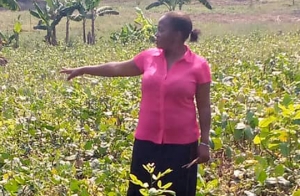Radio programs give rural communities an opportunity for their voices to be heard
“I know that I am privileged to listen and follow different programs aired through MVIWATA FM”, says Odilia Jiovin, a farmer from Kilosa District, known for production and marketing of sunflower, coconut, sugarcane, and sisal in the Morogoro region of Tanzania. “I always take the initiative to share the information with my fellow farmers in our community and apply the knowledge shared through the radio on my farm where other farmers come and learn too,” she says.
MVIWATA is the Swahili acronym for the National Network of Small-Scale Farmers Groups in Tanzania and the group began operating a radio service in August 2020. It is supported by the Forest and Farm Facility (FFF) which is a partnership involving the Food and Agriculture Organization (FAO) of the United Nations and other partners.
To improve her knowledge in farming, Odilia relies on listening to MVIWATA FM’s agricultural radio programs, and this has helped her as well as other farmers to learn better farming skills. The agricultural advisory services have been made easy for Odilia and other farmers through the radio service as they get to learn, ask questions, and gain knowledge that they later apply to their farms.
Radio as the voice of the voiceless
MVIWATA FM attracts smallholder farmers, youth and other marginalized groups, reaching approximately 250,000 people in the rural and urban areas of Tanzania. The radio station has designed its programs to focus on information, education, knowledge sharing, and entertainment related to agricultural practices, and fills the gap left by mainstream media outlets that provide only limited coverage of issues relevant to rural people.
Listeners can tune in to programs produced by a team of journalists who work closely with MVIWATA, and the airwaves also carry recordings of farming community group meetings.
Better production, better lives for family farmers
The various agricultural practices shared through MVIWATA FM have significantly helped farmers to improve farm preparation and pest management, which has helped ensure higher yields. Odilia says that MVIWATA FM programs, like Uzalishaji endelevu (Sustainable Production), taught her about integrated pest management, a low-cost and effective method which she applied in her horticultural farm and which saved her crops, and her money.
Educational programs and information sessions have also supported farmers at the community level. In Ilonga village in Kilosa distric, for example, information on the process of participatory planning helped the community to request a budget for the construction of a health centre. As a result, the central government has allocated some funds for the construction in the 2021/2022 budget.
Other program topics have included crop diversification, market access, social accountability, and handling land disputes.
The Forest and Farm Facility (FFF) supports MVIWATA to share information with family farmers through the radio, sensitizing them on new processes and better farming techniques to improve their livelihoods. The FFF is a partnership between FAO, the International Institute for Environment and Development, the International Union for Conservation of Nature and AgriCord, and was launched in 2012 to improve rural farming, forestry, and farmers’ organizations through collective action. Supporting rural radio, FFF has increased its positive impact and ensured the active engagement of a wide range of family farmers in rural Tanzania and in other African countries.
Read also on FAO Africa webpage
Learn more:
Website: Forest and Farm Facility
Website: FAO Country Profile: Tanzania
Website: MVIWATA
Facebook: MVIWATA FM


Comments are closed, but trackbacks and pingbacks are open.